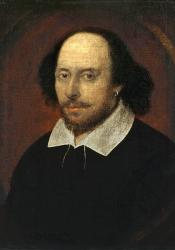Francis Bacon and Shakespeare
In the novel The Eyre Affair, the protagonist Thursday Next is confronted by a “Baconian” who attempts to convince her that that scientist Sir Francis Bacon was the true author of the plays of William Shakespeare (Fforde 37). Though the novel relies heavily on alternate history, this claim is one that has been made historically on many occasions by many people. This claim is seemingly reliant on two pieces of evidence. The first is that Bacon was apparently secretly a poet known to the world under a different name, which is evidenced in several letters; the second is that Ben Jonson eulogized both Shakespeare and Bacon using the same language (“History of the Baconian Shakespeare Authorship Theory”). While the fact that Jonson used identical language for both men is certainly interesting, it is by no means conclusive proof of the sameness of the authors. Thus, the claim must be supported on the merits of the first argument, that Bacon was secretly a poet of considerable ability. This claim does not hold true to reality. Upon examining some of the works written by Bacon, some have concluded that “the man could not write a play. We know this because he penned some court entertainments, and they are sadly static affairs in which stock characters—a hermit, a soldier, a secretary—stand and deliver set pieces about the joys of being a hermit, a soldier, a secretary. There’s not a trace here of the grasp of plot, character, nuance, conflict that we expect in Shakespeare’s plays. In short, Francis Bacon had no drama” (Stewart).
Why then, if the evidence does not hold up to scrutiny, has the claim continued to exist, and, in the world of The Eyre Affair, grown to have door-to-door proselytizers? The evidence may be found in one of the claims of the Baconian in the novel. In response to Thursday saying “if you expect me to believe that a lawyer wrote A Midsummer Night’s Dream, I must be dafter than I look,” the Baconian says “not as daft as supposing that a Warwickshire schoolboy with almost no education could write works that were not for an age but for all time” (Fforde 38). Here, the reader is presented with an unfortunately common attitude in literary circles. The idea that an uneducated person could not produce great works of art is classist, and that classism is at the heart of the majority of the theories behind the “true” identity of William Shakespeare. It is a great shame that some cannot stomach the merest possibility of Shakespeare’s “low” social status and must create poorly supported conspiracy theories to explain the quality of his work. It is not shocking that in a fictional world in which literature is given even higher regard than it is in the real world, that these classist attitudes would find even more public avenues to spread and that some would feel comfortable enough to so blatantly express that attitude.
Works Cited
Taylor, John. Chandos Portrait. Wikimedia Commons, https://en.wikipedia.org/wiki/File:Shakespeare.jpg. Accessed 9 Apr. 2022.
Fforde, Jasper. The Eyre Affair. Penguin, 2001.
“History of the Baconian Shakespeare Authorship Theory.” Shakespearean Authorship Trust, https://shakespeareanauthorshiptrust.org/bacon-history. Accessed 9 Apr. 2022.
Steward, Alan. “Sir Francis Bacon and Shakespeare’s Authorship.” Shakespeare Birthplace Trust, https://www.shakespeare.org.uk/explore-shakespeare/podcasts/60-minutes-shakespeare/sir-francis-bacon-and-shakespeares-authorship/. Accessed 9 Apr. 2022.

